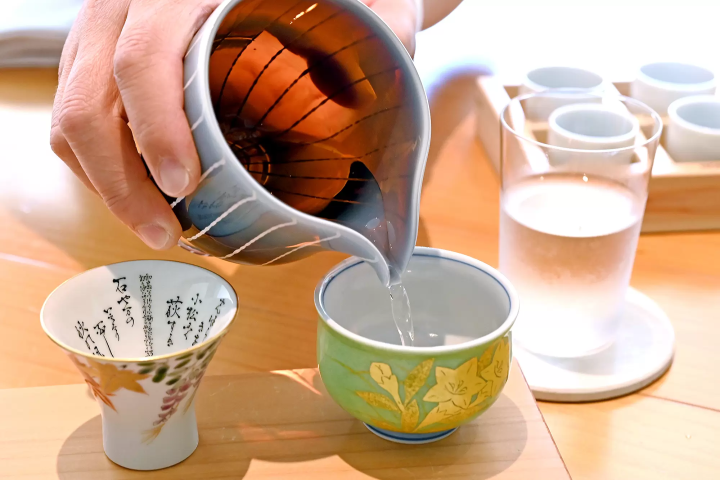Nara's Bowing Deer - 5 Tips On How To Treat Them The Right Way

Many people visit Nara to meet famous bowing deer of Nara Park. You might have heard scary stories of deer kicking people, biting and stealing food but there are some simple steps you can take to prevent this.
Many people visit Nara for the historical sights and the lovable bowing deer of Nara Park. Unfortunately, in the recent years, the number of sick animals and accidents has increased.
Nara's deer are really calm and accustomed to the presence of humans. However, just like humans, animals can have a bad day. Many of these accidents can actually be prevented if visitors follow some simple steps to keep themselves and the animals safe.
1. Remember that the Deer Are Wild Animals
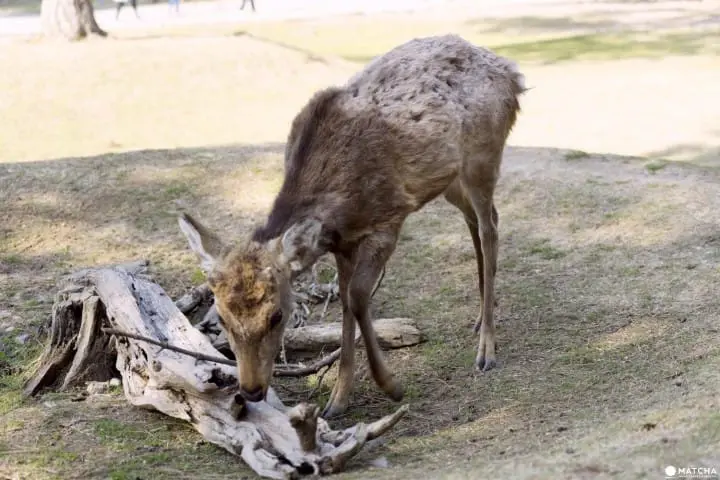
The most important point to remember is that the deer in Nara are living there because they have been considered sacred animals. Even though they are very used to the presence of humans, they have not been domesticated and they aren't pets. If they don't like what you are doing to them they will bite or kick.
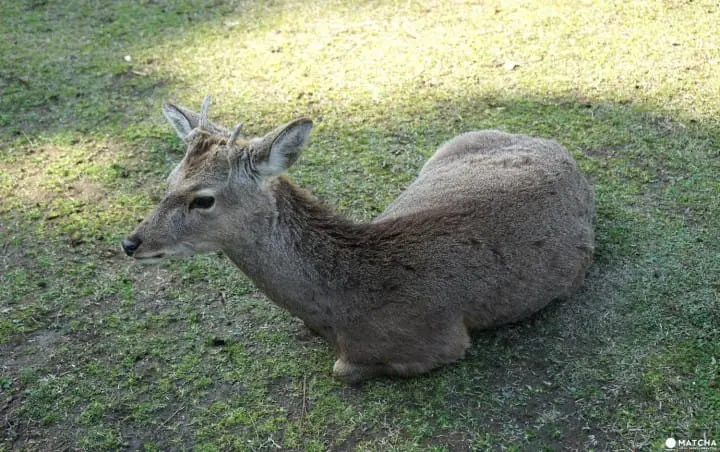
Nara's deer are small compared to the deer in other parts of the world. You will probably want to pet them because they are so cute. If they lay down to relax somewhere they might even let you touch them but usually, they will not enjoy being petted.
If you want to try it anyway, slowly approach the deer with your hand extended towards it. If it turns away or shows you that it doesn't want to be touched, you should refrain from petting it to avoid any accidents.
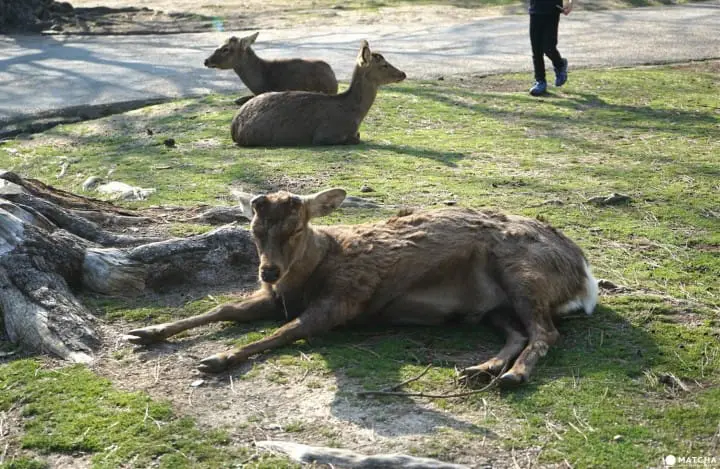
Furthermore, don't leave your children alone with the deer. Children might try to approach the deer from behind or make fast movements the animals might not like. In this case, the deer might bite or kick and might cause severe injuries.
2. Try to Communicate with the Deer through Bows

There are some shops around Nara Park where you can buy deer snacks, also known as deer crackers. As soon as you get them you will be surrounded by deer.
Try to find a secure place where you can face them. They know you have crackers so they will want your attention. If they are behind you they might headbutt you or pull on your clothes.
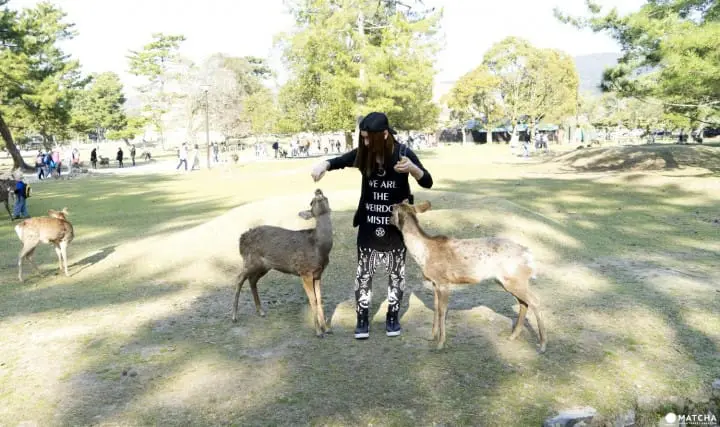
While you are feeding the deer in front of you, try to keep alert. It can be quite overwhelming as other deer might try to approach you from all sides.
Refrain from going backward if you are not absolutely certain there is no deer behind you. The Nara deer are not very aggressive but if you accidentally hurt them, they might hurt you.
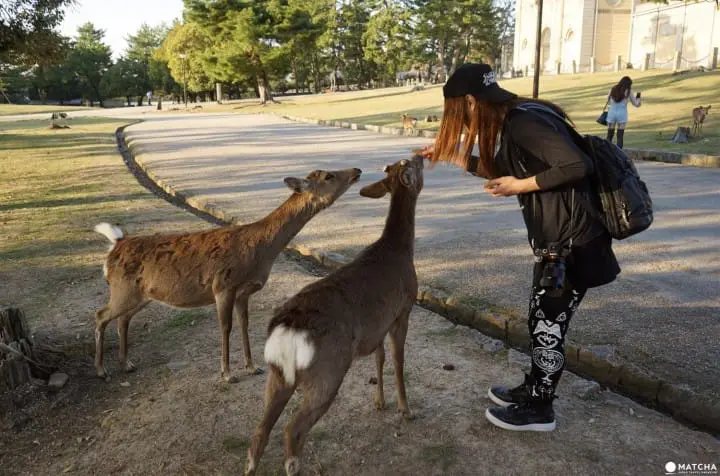
Another tip to keep them calm is to make them do what they are famous for - bowing. If you bow to them they will probably bow back and expect a cracker for it.
How about using this order?
1. Bow to the deer.
2. Let the deer bow back.
3. Feed the deer a cracker.
It might surprise you how well behaved they suddenly are! They are smart and they know they will be fed if they bow. They will only pull at your clothes if they feel left out after this.
Sometimes you might even encounter a small fawn just learning how to bow back at you. They don't quite grasp the concept yet and they will get overrun by the older deer so try to award them with a cracker for their adorable attempt.
3. Don't Tease the Deer
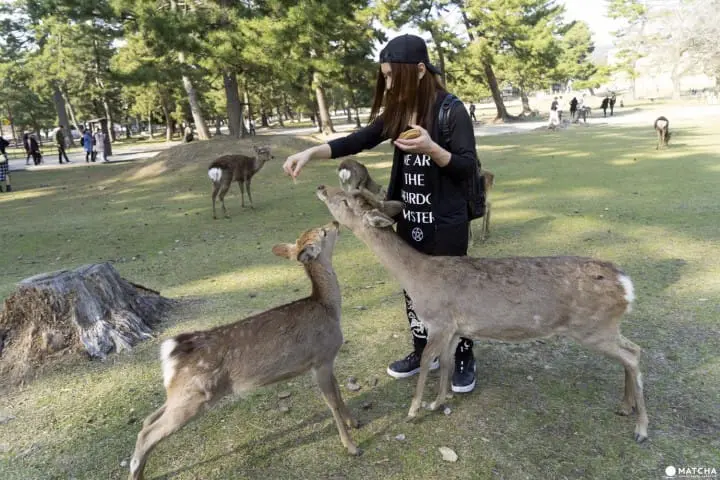
This point ties in with the first point. The deer are wild animals and it can be incredibly dangerous to tease them.
I have encountered people putting deer crackers in their mouth to make the deer get it from there or holding them over their head so the deer can't reach them. If you do this to a deer with a short temper they might simply headbutt you in the stomach or bite you to get the cracker.
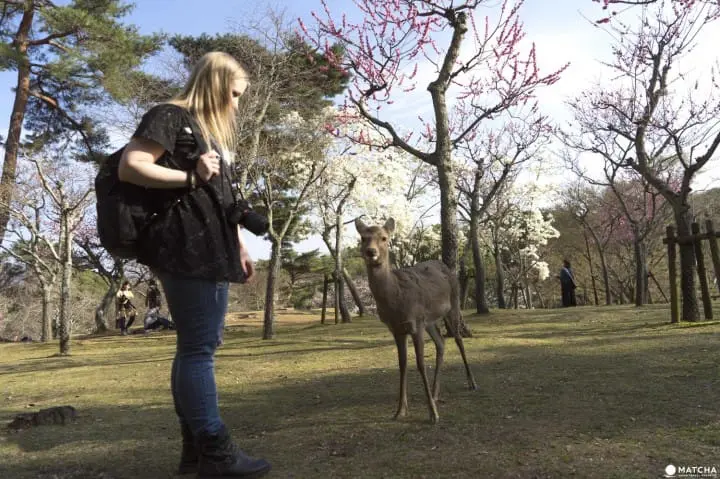
It has been reported that some people even tried to ride the deer. The legend related to the Nara deer says that a god came riding into Nara on a deer's back, which is why they are considered sacred animals. However, it is not recommended to reenact this legend. No deer will enjoy this attempt.
Besides hurting yourself if you try something like this, you might also hurt the animal. As mentioned before, they are quite small and cannot carry a human.
Please treat them with respect and keep a healthy distance.
4. Feed Them Only Deer Crackers
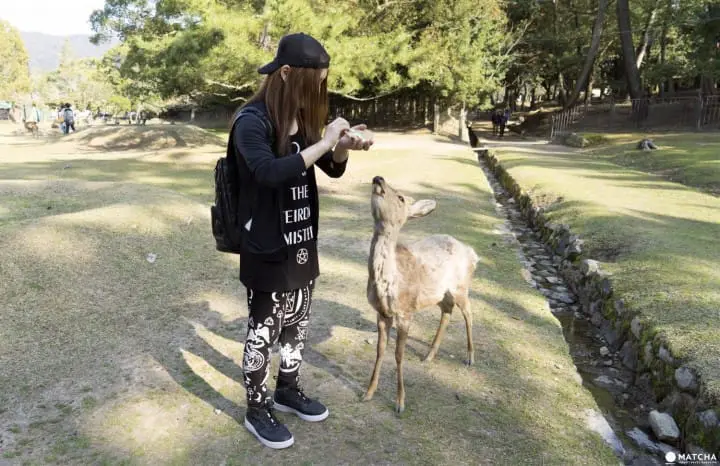
The deer crackers you can buy at the shops contain only ingredients that are safe for the deer to eat. They are not made for human consumption so please avoid trying them yourself. They aren't bad for you but they will probably not taste very good.
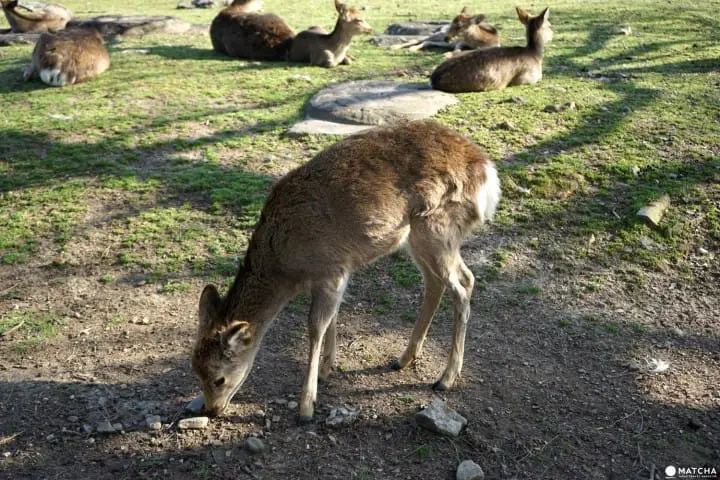
The deer are herbivores so they can eat a variety of leaves, fruit, nuts, and seeds. However, if you are not sure what they can eat, it's better to feed them only the crackers that are recommended for them.
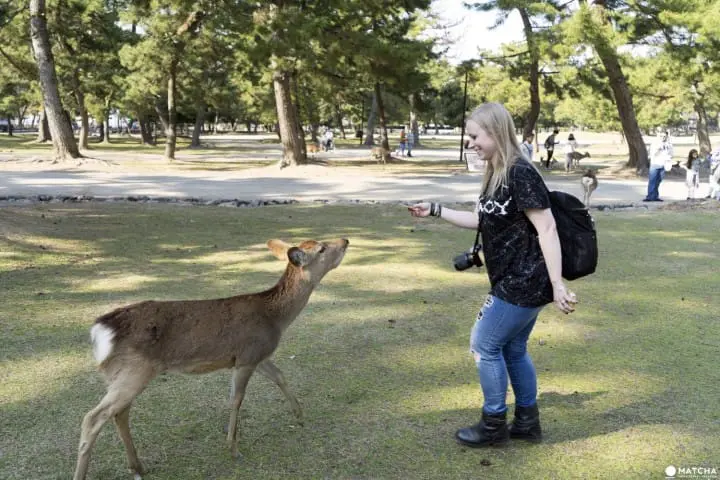
If you try to feed them anything meant for human consumption they might eat it because they are curious but it can make them very sick or even kill them. As mentioned before, they aren't domesticated and don't belong to anyone so there are no doctor visits or health checks for them. Therefore, please only feed them snacks their body can handle.
5. Finish Your Food Before You Enter The Park
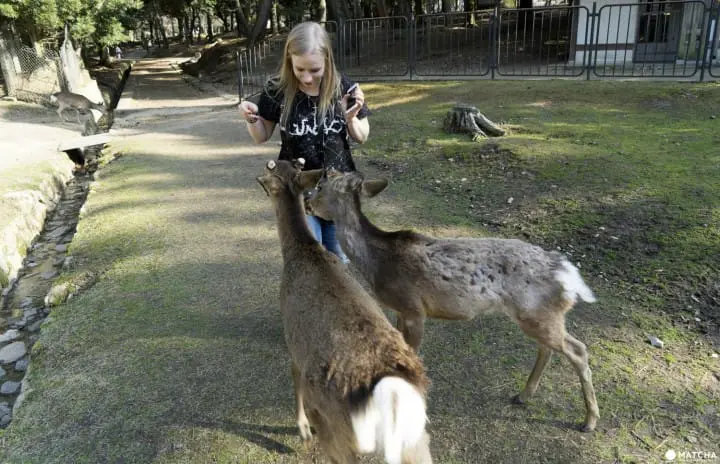
If you get a snack on your way to the park, it's recommended that you finish it off before entering the park. The deer are very curious and if you have something in your hand, they will think it's meant for them. They might even try to eat it and if they succeed your snack will be gone and the deer might get sick.
Recently some deer have passed away from as much as three kilos of plastic in their stomach. If they smell food they don't understand what's edible and what is not, so even if you carry snacks or food around in plastic bags, they might just eat it including the bag if you don't pay attention.
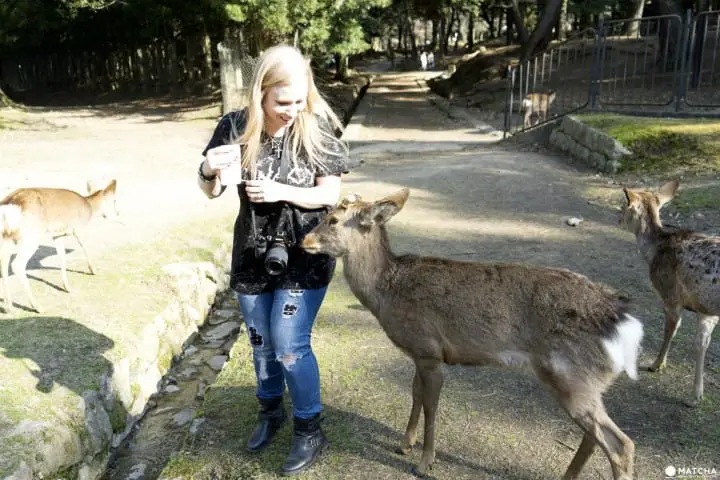
Generally, try to have your hands free so they don't walk after you thinking that you have deer crackers. They might even try to eat your pamphlet or phone. If it's in your hand it might be considered food.
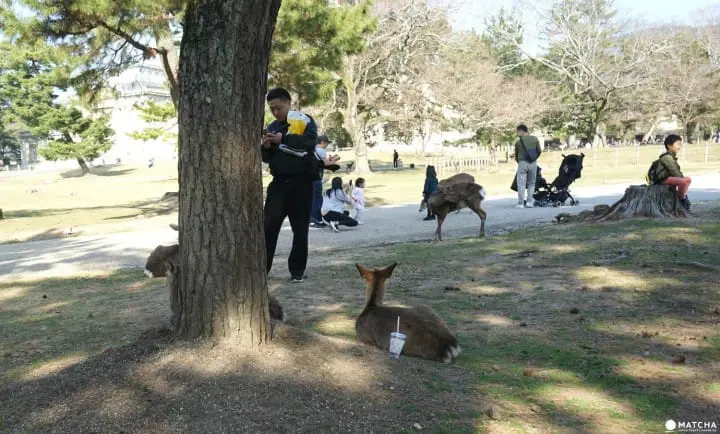
You also should be aware that there are no garbage cans in Nara Park because the deer would try to eat some of the garbage. If you have any kind of garbage please refrain from leaving it in the park. Take it with you and dispose of it at the next convenience store to prevent the deer from getting sick by eating some of the garbage you left.
Remember that the Deer Are Considered Sacred Animals
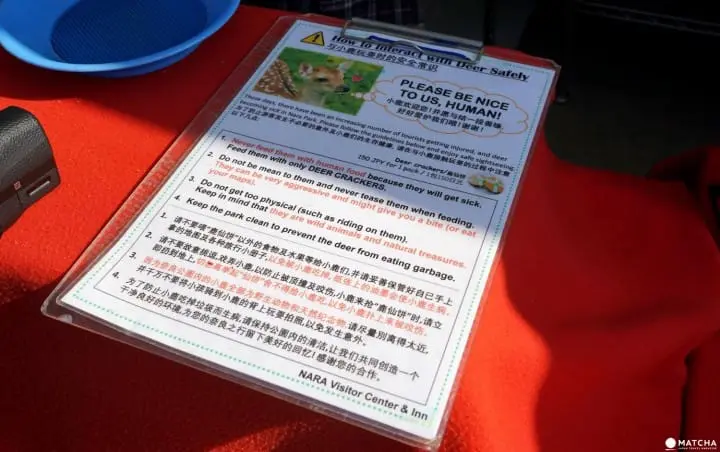
Always remember that these deer are living in Nara Park because they have been considered sacred animals and protected since ancient times. If you follow these simple tips and treat them as the national treasures they are, you make sure that you and the deer will truly enjoy your time in Nara.
I was born and raised in Berlin, Germany and am living in Tokyo, Japan since 2008. I am native in German and English.
I am a cat-mom to three rescue cats and I have a deep love for 90s rock music, kickboxing, history, chocolate and cookie dough, anything pistachio flavored, cats and bats, dragons and vampires and all things creepy-cute.
My favorite book author is Anne Rice. My favorite band is LUNA SEA.
My most recommended Japanese movie is 'Merry Christmas, Mr. Lawrence', featuring David Bowie and Ryuichi Sakamoto.


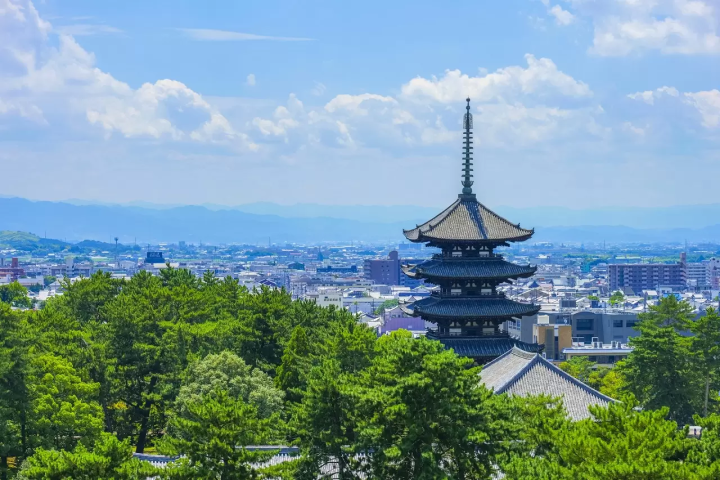



































![[Kagoshima] Enjoy Minamisatsuma City to the Fullest! A Guide to the Scenic Beauty and Culture of Five Areas](https://resources.matcha-jp.com/resize/720x2000/2026/02/15-258755.webp)
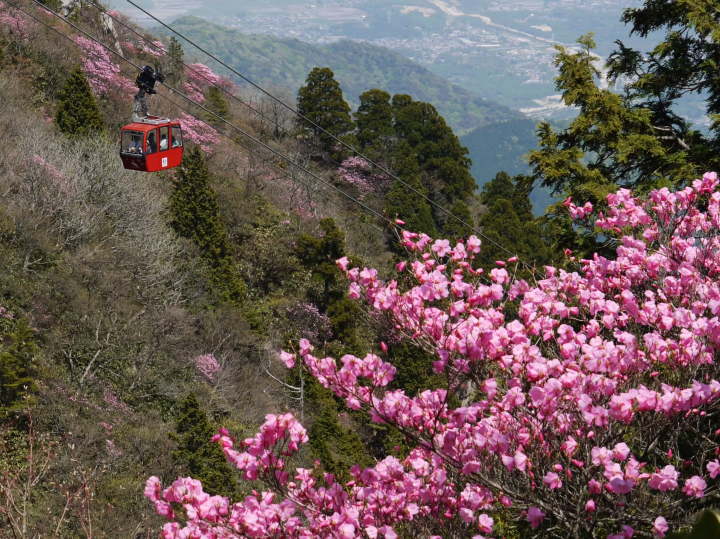
![[Yufuin]Yufuin in 100 Minutes: Quick Access Guide](https://resources.matcha-jp.com/resize/720x2000/2026/02/15-258738.webp)
![[Shinjuku Nishiguchi HALC] About the d Point Campaign](https://resources.matcha-jp.com/resize/720x2000/2026/02/14-258714.webp)
